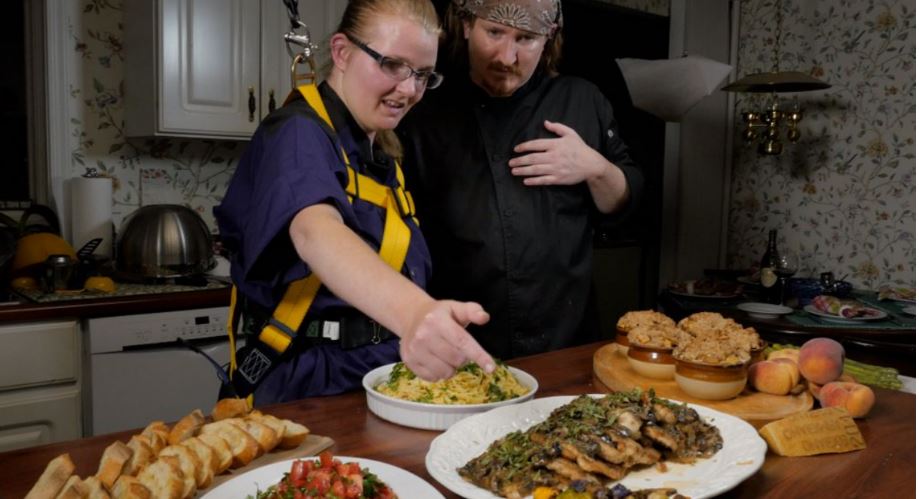On October 2, 2010, the lives of Corey Beattie and those close to her changed forever. Beattie, an aspiring chef, was involved in a serious car accident, which left her with a traumatic brain injury. As a way of coping with the tragedy, good family friend and Philadelphia filmmaker Jonathan Ristaino came up with the idea to document Beattie’s progress and follow her journey. Ristaino began filming Beattie in 2012. After five years of ups, downs, triumphs, and tribulations, he will screen his finished piece, Brain Crumbs, on April 22 at Penn Cinema in Wilmington.
Tickets are $17.
Get tickets
“I decided to film Corey because I wanted to expose her struggle and give [Beattie and her family] a voice,” he said.
Although several other filmmakers have featured stories of those suffering from brain injuries, very few have shown what happens after the first year of recovery. Ristaino and the rest of the Brain Crumbs crew followed Beattie and her family for five years.
Brain Crumbs gives an in-depth look at what it takes to recover from a traumatic brain injury. The film shows Beattie as she struggles to complete everyday tasks and how her family comes together to give her the strength to move forward.
Aaron Stevens, Ristaino’s former college roommate and a fellow journalist, helped him develop the film’s plot.
“We needed to decide what was important for our audience to know. We had to make sure the audience could follow the story and not get bogged down by countless details,” he said in a statement. “We both felt the only way to tell this story was to capture Corey in her every day. We had to make you a part of her life, and also show you how she was in her element — the kitchen.”
Throughout the film, you will see Beattie working toward her dream of becoming a chef. Her mother, Marie Beattie, even came up with “cooking therapy” so she could use food as a part of her recovery. During Brain Crumbs, Beattie works with executive chef Dave Allen from Philadelphia’s The Tavern to prepare a three – course meal.
Ristaino, who owns FarmCat Media, said this documentary is different from other films on the topic because it shows every aspect of the recovery process — good and bad.
“We didn’t sugarcoat it. We stayed true to what was really happening. We showed the family when they were in deep thought and dealing with not so fun things,” he said.
Ristaino added that it was not always easy to capture the 24-year-old’s recovery on camera.
“Our film kind of fell flat for a little bit,” he told us during a phone interview. “We knew she was progressing and we could see the progress ourselves. But, it was hard for us to showcase it, because we were unable to do a traditional interview with Corey.”
Brain Crumbs got the spark it needed when Beattie began working at University of Delaware’s GoBabyGo! Café (We spoke with Dr. Cole Galloway, University of Delaware professor and founder of the GoBabyGo! Research program, in 2014 when the cafe opened.), which employs adults with limited mobility and gives them the chance to rehabilitate in a real-life work setting. While at the cafe, employees are placed in harnesses, which allow them to move freely without the risk of falling.
“It is a simple mechanical system, providing fall support. You can’t fall in it, and it also provides body weight support, which means it lifts you up a little bit,” Galloway explained in a statement. “The fall support enables you to push the boundaries of what you can (physically) do; it would allow you and I to go down a black diamond ski slope.”
That harness was just the catalyst both Brain Crumbs and Beattie needed.
“Once they put her in that harness and we saw her and her improvements, we knew we had what we needed to finish the film,” Ristaino said, adding that the mobility and freedom that Beattie gained from the harness gave her such a strong presence.
He hopes Brain Crumbs will not only bring Beattie’s story to life, but will also bring awareness to those with traumatic brain injuries and the innovators who work in the field.
“I am super excited to get it out there in the world,” he said. “I want the film to give people hope and show them that they don’t have to give up.”
Before you go...
Please consider supporting Technical.ly to keep our independent journalism strong. Unlike most business-focused media outlets, we don’t have a paywall. Instead, we count on your personal and organizational support.
Join our growing Slack community
Join 5,000 tech professionals and entrepreneurs in our community Slack today!




